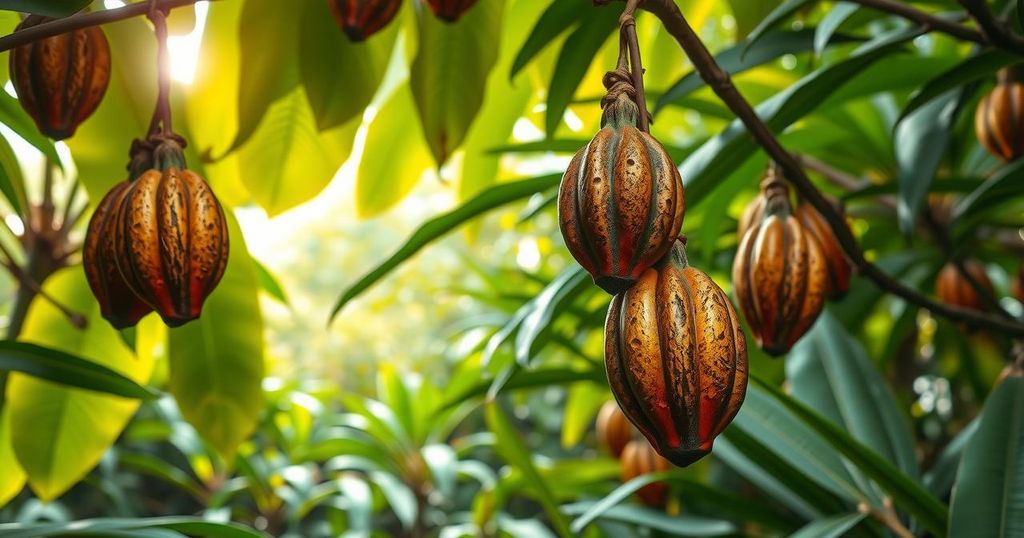Cocoa Exports – PNG: Strong Year for Cocoa But Coffee to Reclaim Leadership in 2025

Papua New Guinea reported a record year for cocoa exports in 2024, outpacing coffee revenue for the first time. However, forecasts indicate that coffee will regain its leading position in 2025 due to anticipated higher yields and prices. Cocoa production faces severe challenges amid declining crop levels, while strong demand continues to drive coffee prices upward. Overall, the 2025 export landscape is expected to favor coffee, with substantial growth anticipated in revenues for both crops.
Papua New Guinea achieved a significant milestone in cocoa exports in 2024, generating PGK1,233 million in revenue, thereby exceeding coffee revenue, which reached PGK989 million. This marks the first instance in PNG’s history where cocoa has outperformed coffee. However, experts predict that this dominance may be temporary as increases in cocoa supply remain constrained by historically low crop sizes.
The coffee sector is projected to rebound in 2025, following a low yield season last year. The cyclical nature of coffee production, alternating between high and low-volume seasons, suggests a strong recovery is imminent. A recent increase in coffee prices, driven by adverse weather affecting Brazil’s crop, further supports this expectation. This may enable coffee to reclaim its traditional lead over cocoa.
Forecasts for 2025 indicate that coffee export revenue could reach PGK1,580 million, while cocoa might generate PGK1,363 million, totaling combined revenues of PGK3,000 million, thus exceeding last year’s record of PGK2,222 million. The competitive nature of cocoa and coffee pricing will continue, with both crops experiencing fluctuations due to global market conditions.
Cocoa production experienced a decline of 13.1% in 2024, influenced by drought and disease in major producing regions, leading to a substantial increase in prices averaging USD8,214 per ton. However, late rains in West Africa have sparked hope for improved mid-crop production. Despite a slight decrease in cocoa prices in February averaging USD9,917 per ton, the overall market remains tight due to persistent crop shortages.
Conversely, the coffee sector faced production challenges in late 2024 as a result of La Niña weather patterns affecting Brazil’s Arabica beans. Brazil represents approximately 40% of global coffee production, and forecasts suggest reduced yields in the upcoming harvest. Coffee prices spiked to unprecedented levels, hitting USD4.39 per pound in mid-February, contradicting expected production declines.
In 2024, Papua New Guinea exported 827,100 bags of coffee, a decrease of 14.1% from the previous year. As the current low-volume coffee season progresses, the upcoming high-yield season beginning in May 2025 could see exports exceed one million bags, bolstered by strong local prices that incentivize farmers. However, this price surge poses challenges for participants in the coffee supply chain regarding funding for procurement.
On the cocoa front, exports rose marginally to about 39,000 tons in 2023 due to remarkably high prices. Despite soaring values, PNG’s cocoa output has been hindered by a shift from cocoa to other crops like balsa wood. The hope remains that higher cocoa prices might encourage farmers to enhance yields, with predictions estimating 42,000 tons of cocoa exports in 2024.
Overall, the coffee market is expected to regain its strength, likely surpassing cocoa in terms of export revenue in 2025. Historically, coffee has been more lucrative, and prevailing pricing trends coupled with higher export volumes will support this outlook. Papua New Guinea must remain competitive in the international commodity market by aligning local prices with global trends, essential for sustaining its export capabilities.
In conclusion, Papua New Guinea has witnessed robust cocoa export performance in 2024, but forecasts suggest that coffee will reclaim its position as the leading export commodity in 2025. Persistent constraints on cocoa supply and promising prospects for strong coffee yields highlight significant market dynamics. The agriculture sector’s adaptability, influenced by weather patterns and global pricing, will play a critical role in shaping future export revenues.
Original Source: www.fijitimes.com.fj








